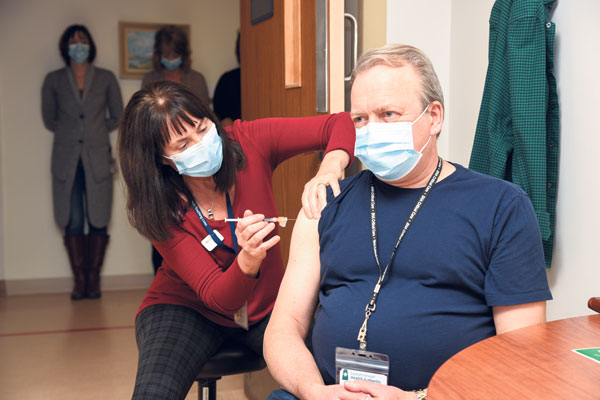
The Saskatchewan Health Authority’s executive director of Infrastructure, Information and Support says the province will have enough vaccines to inoculate roughly half of the 190,000 people identified as phase one priorities.
However, he also said a vaccine shortage could hinder any further efforts.
Derek Miller told reporters on Thursday the province is doing everything it can to speed up the vaccination rollout, but without a steady stream of vaccine deliveries, healthcare workers will face long delays. “We anticipate, as we continue to ramp up the doses delivered per day, that we will experience shortages going forward and we may run out before the next allocation,” Miller told reporters during an update on Thursday. “Based on our target of the speed of delivery, we do expect that over the coming weeks and months, we will go through periods of having an allocation arrive, then looking to deliver it as quickly as possible, then wait for the arrival of the next delivery. “Speed really matters in this,” he added. “Every day counts to save lives.” Healthcare workers are currently distributing the vaccine at more than 20 locations around the province. Miller said improvements to transportation and storage techniques meant they’ve been able to reach priority populations outside of major centres and speed up the rollout. However, without a consistent supply, Miller said they won’t be able to go much faster. “We know that a stable, predictable and large volume allocation will really enable us (in) rapid delivery,” he explained. “Every corner is ready. We have a posture of readiness so that when we receive allocations of the vaccine, we can safely deliver it to the populations in those areas.” As of Thursday, healthcare workers have administered nearly 12,000 doses.
The province received roughly 6,800 doses of the Pfizer vaccine on Jan. 12, and expected receive another 5,400 Moderna doses on Jan. 14. The SHA said the shipment of Moderna doses has been delayed. It’s expected to arrive on Jan. 15. SHA CEO Scott Livingstone urged residents to be patient as the rolled out the vaccines to new locations.
Like Miller, Livingstone said regular, consistent shipments would help speed up the process. However, he also pointed out that it would be months before most of the population was fully vaccinated.
“This only marks the beginning of the end, and not the end itself,” he said.
“We still have a long way to go.”
The federal government made another vaccine purchase on Tuesday to help speed up the rollout, but those doses likely won’t arrive until April at the earliest. Prime Minister Justin Trudeau said they’ve exercised an option in their agreement with Pfizer to secure another 20 million doses of the vaccine. Trudeau said the country remains on course to be immunized by September, and he pushed back against that notion the federal government wasn’t communicating well with the provinces.
“All provinces and territories know how many vaccines they’ll be receiving every week between now and the end of February,” he told reporters. Health officials in Saskatchewan say the healthcare system is in its most vulnerable state, and urged residents to continue following public health orders.
Dr. Saqib Shahab, Saskatchewan’s chief medical health officer, said the COVID-19 virus is tougher to fight than SARS because it can spread even without patients showing symptoms. He said the high numbers of people in hospital and ICU showed residents need to return the cautious behavior they showed pre-Christmas.
“It’ll be well into the spring (until) we see the … vaccines having an impact on our total number of cases,” he said on Thursday. “While it’s really good that vaccinations have started, we really have to stay the course with our public health measures. Shahab characterized the last seven days as an “up and down week” for new cases numbers. He said if case numbers don’t start dropping soon, he’ll speak to the Ministry of Health about increasing restrictions. “This is really a critical time for us to try and bring those (case) numbers down, just as we did in December,” he said.

